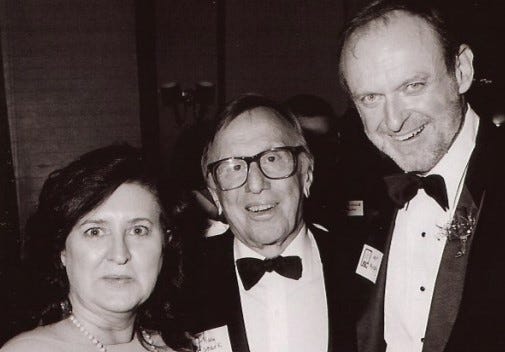Honestly covering the theatrical box office in 2024 is not a pretty task.
Distribution execs have always been salespeople. That is the heart of the gig. They have always been there to build relationships with theater owners and to get their product into the theaters of their choice with the best possible deals to chase the best possible financial outcome. And there is absolutely nothing wrong with that.
When I was an actual kid, there was A.D. Murphy at Variety, who really invented box office reporting. He was seen as a tough guy… no nonsense. But his reputation softened when he wasn’t holding distributors’ feet to the fire. He moved over to run the Peter Stark Motion Picture Producing Program (named for producer Ray Stark’s son) at USC in 1979 for the first dozen years of its existence.
But Art (as Len Klady - one of those who tried to fill his shoes - called him) was pretty much it. By the time I started diving into this professionally, it was the mid-1990s and Exhibitor Relations was still run on paper, phone calls in and out from distributors and exhibitors, and the new innovation of a fax machine churning out the weekend box office report on Sunday morning to everyone who needed to know.
“#1 Movie in America” was a thing back then. But box office and peripheral analytics (like CinemaScore and weekly tracking “reporting”) had not yet been weaponized. When I started doing a daily column in 1997/1998, I wrote on Saturday about Friday numbers, projecting out the whole weekend a bit… forever clear about both Saturday and Sunday not yet happening, so not being defined. But that was considered pushing the boundaries at the time. A few others, like Gitesh Pandaya, did likewise back then.
But like so many things that have gone completely sideways about entertainment journalist (it was always a bit iffy), Nikki Finke had a profound effect on weaponizing information without any real knowledge. Nikki hated box office and awards writing. I mean, hated. But when Sony gave her early intel on numbers for The Da Vinci Code and she published a story, pretending, as always, to be more than a revolving door for the information fed to her by sources, it got picked up by her pal Matt Drudge, and the race to the bottom had begun.
In trying to dominate the market - which she did in terms of traffic, thanks to what became a weekly Drudge link - Nikki started such silliness as reporting Friday numbers based on east coast matinees and reporting out (aka, repeating what the studio distributions execs told her) the whole weekend before noon on Saturday. This is one of the major click-count elements that built Deadline in the years before Penske bought Deadline, after which Nikki & Jay would eventually hire trade writers to become a real staff, most of whom still run the place today.
But box office has become its own little power arena, driven by the demand for clicks on websites that do well comverting them to cash, not for accuracy or insight in terms of the reporting. I don’t have anything against the trade writers who write about it. In fact, I am a big fan of Anthony D'Alessandro as human being and as a thinker. (I don’t really know the others personally, as they generally avoid eye contact with me. Many cowards in this segment of the profession do likewise.) But the level of journalistic focus in most outlets covering the box office is low. Trends overwhelm valuable history. And the “everyone is a critic” mindset of the internet makes it even more of a clusterfuck. The media has been a major part of turning the brains of very smart executives with access to all of the analytical work around a movie into mush, convincing them that, for instance, Rotten Tomatoes matters to their openings as a driver, rather than a slight reflection of the marketing they have done.
Of course, Rotten Tomatoes has now all but eliminated critics as a major driver of their web page, focusing more on public voting and marketing, marketing, marketing. You know… the website built on the idea of bringing together all the movie critics in one place so you could read a range of smart criticism from across the globe is now de-emphasizing those pesky critics.
But this is all really background about what is going on right now, embodied by the soft openings of Challengers and The Fall Guy.
During COVID and since, distribution has done very little to help exhibition return to The Norm. After 5 straight years (2015-2019) of domestic theatrical in the $11 billion range - all the while with the media insisting theatrical was dying - COVID came and closed almost all theaters for over a year. And over the course of 2 years, had all parties struggling for air.
Around Christmas 2021, the industry took its first deep breath in almost 2 years, as Spider-Man: No Way Home rocked the holiday and early 2022 with $805 million domestic and another $1.1 billion in international grosses.
Keep reading with a 7-day free trial
Subscribe to The Hot Button by David Poland to keep reading this post and get 7 days of free access to the full post archives.




